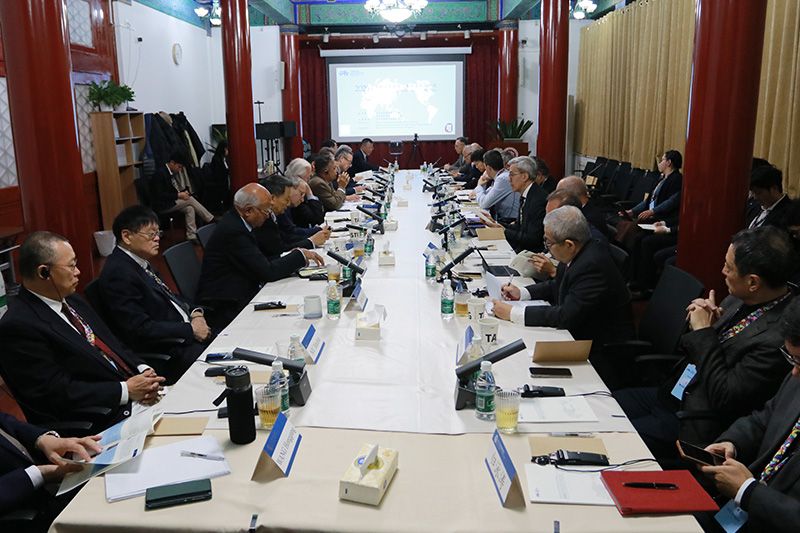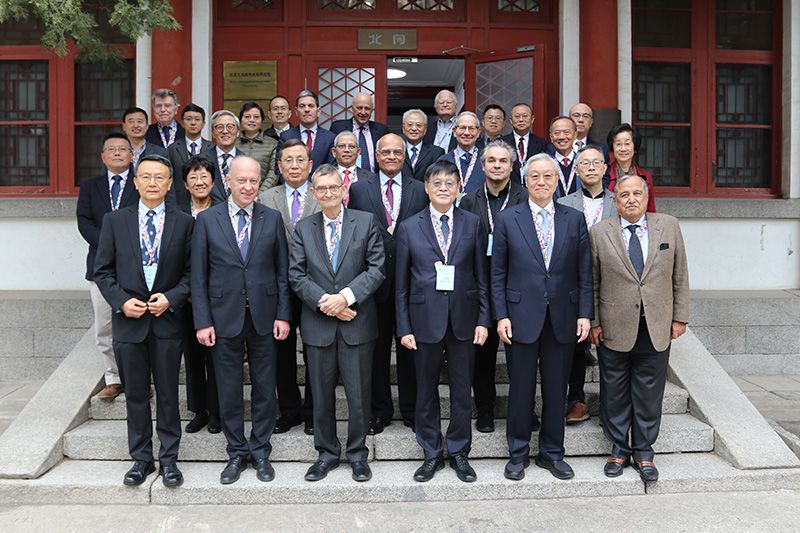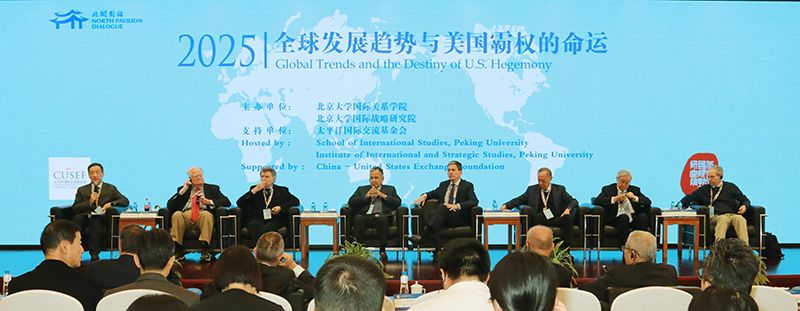The 11th Annual Conference of the North Pavilion Dialogue was successfully held at the North Pavilion of Peking University (PKU) from October 23 to 24, 2025. Organized by the Institute of International and Strategic Studies (IISS), PKU, the event received strong support from the university and the School of International Studies (SIS), PKU. The “North Pavilion Dialogue” annually invites former political dignitaries and renowned experts with extensive political experience, profound academic expertise, and broad strategic vision to discuss international dynamics and the future of global politics.
This year’s theme, “Global Political Trends and the Destiny of U.S. Hegemony,” brought together leading scholars and policymakers from around the world to discuss the profound and complex impacts of recent political changes in the United States on global and regional dynamics. Participants noted that the current domestic political changes of U.S., widening transatlantic divergences on political and security issues, and the escalation of conflicts in the Middle East, have significantly affected global stability. Amid these challenges, China continues to deepen cooperation with countries around the world and remains committed to promoting regional and global peace and development. Participants called for China and the United States to move toward each other on the basis of mutual respect, peaceful coexistence, and win–win cooperation, while urging all nations to strengthen coordination and collaboration in addressing shared global challenges and advancing common development and security.

The conference gathered 16 distinguished international participants, including: Lionel Barber, Author, Broadcaster and Former Editor of The Financial Times; Robert D. Blackwill, Senior Fellow, Belfer Center for Science and International Affairs, Harvard Kennedy School (HKS), and Former U.S. Ambassador to India; Nabil Fahmy, Dean Emeritus, School of Global Affairs and Public Policy, The American University in Cairo, and Former Foreign Minister of Egypt; Kim Sung-Hwan, President, Taejae Future Consensus Institute, and Former Minister of Foreign Affairs and Trade of the Republic of Korea; Andrey Kortunov, Director General and Academic Director, Russian International Affairs Council; Charles A. Kupchan, Senior Fellow, Council on Foreign Relations, and Professor of International Affairs, Georgetown University; Mark Leonard, Co-Founder and Director, European Council on Foreign Relations; Shivshankar Menon, Former National Security Advisor to the Prime Minister of India, Former Foreign Secretary of India, and Former Indian Ambassador to China; David Miliband, President and Chief Executive Officer, International Rescue Committee (IRC), and Former Foreign Secretary of the United Kingdom; Thierry de Montbrial, Executive Chairman, French Institute of International Relations (Ifri), and Founder, World Policy Conference; John Negroponte, Vice Chair, McLarty Associates, and Former Deputy Secretary of State of the United States; Volker Perthes, Senior Advisor, German Institute for International and Security Affairs (SWP), and Former Under-Secretary-General of the United Nations; Rizal Sukma, Senior Fellow, Centre for Strategic and International Studies, and Former Indonesian Ambassador to the United Kingdom, Ireland, and the International Maritime Organization; Akio Takahara, Emeritus Professor, University of Tokyo, and Distinguished Visiting Professor, Tokyo Woman’s Christian University (participated online); Dennis Wilder, Former Special Assistant to the President and Senior Director for East Asia, White House National Security Council, and Senior Fellow, Initiative for U.S.–China Dialogue on Global Issues, Georgetown University (participated online); and George Yeo, Former Minister of Foreign Affairs of Singapore.
Prominent Chinese participants included Cui Tiankai, Former Chinese Ambassador to the United States; Chen Xiaogong, Former Deputy Director, Foreign Affairs Office of the CPC Central Committee, Lieutenant General (retired), PLA Air Force; Yao Yunzhu, Director Emeritus, Center on China-American Defense Relations, and Major General (retired), Academy of Military Science, PLA; Chen Dongxiao, President and Senior Research Fellow, the Shanghai Institutes for International Studies (SIIS), and Vice Chair, China National Association of International Relations; Wang Honggang, Director, Institute of Peaceful Development, Chinese Academy of Social Sciences; Yan Xuetong, Distinguished Professor and Honorary President, Institute of International Relations, Tsinghua University; Wang Dong, Executive Director, Institute for Global Cooperation and Understanding, and Deputy Director, Office for Humanities and Social Sciences, PKU; Jia Qingguo, Professor and Former Dean, SIS, PKU, and Standing Committee Member of the 14th National Committee of the Chinese People’s Political Consultative Conference; Wang Yizhou, Dean, Institute of Area Studies, Nanjing University, and Professor, SIS, PKU; Niu Xinchun, Vice President(Academic), Ningxia University, and Executive Director, China-Arab Research Institute, Ningxia University; and Huang Dizhong, Vice Chairman and Secretary-General, China–United States Exchange Foundation (CUSEF).
The meeting was also attended by Yu Tiejun, President, IISS, PKU; Wang Jisi, Founding President, IISS, PKU, and Professor, SIS, PKU; Yuan Ming, Senior Advisor, IISS, PKU, and Honorary Dean, Yenching Academy, PKU; Guan Guihai, Executive Vice President, IISS, PKU, and Associate Professor, SIS, PKU; and Gui Yongtao, Vice President, IISS, PKU, and Associate Dean and Associate Professor, SIS, PKU.

On the afternoon of October 24, the SIS and the IISS co-hosted a public forum titled “Global Trends and the Future of U.S. Hegemony.” Participants including Robert D. Blackwill, Nabil Fahmy, Kim Sung-Hwan, Charles A. Kupchan, David Miliband, Thierry de Montbrial, George Yeo, Lionel Barber, Andrey Kortunov, Shivshankar Menon, John Negroponte, Volker Perthes, and Rizal Sukma held candid and engaging discussions on topics such as the impact of U.S. domestic politics on global development, the United States’ willingness and capacity to sustain the international order, and policy of various nations in response to shifting global dynamics. Professors Wang Yizhou and Yu Tiejun chaired the two sessions of the open forum respectively.


Formally established in October 2013, IISS, PKU operates under the leadership of PKU. Leveraging the intellectual resources of the SIS and other related departments, the IISS undertakes research projects entrusted by government agencies and enterprises. IISS is dedicated to providing high-quality consulting services for China’s international strategy and foreign policy. It also maintains close collaborative relationships with prominent think tanks and academic institutions worldwide.
Since 2014, IISS, PKU has hosted the annual North Pavilion Dialogue. This initiative is part of PKU’s efforts to implement President Xi Jinping’s directive to build a new type of think tank with Chinese characteristics. IISS is committed to developing the North Pavilion Dialogue into a premier platform for fostering exchange and collaboration among domestic and international experts in international strategy. The dialogue aims to promote in-depth discussions and assessments of global affairs, enhance China’s role on the international stage, and promote cooperation, mutual benefit, and inclusive development in world politics.
The North Pavilion of the "North Pavilion Dialogue", formerly known as the Miner Hall, is located in the central part of the scenic Yan Yuan Garden and now accommodates the office of IISS, PKU.
Editor: Li Fangqi Photographer: Zheng Huaizhou



 Features
Features










